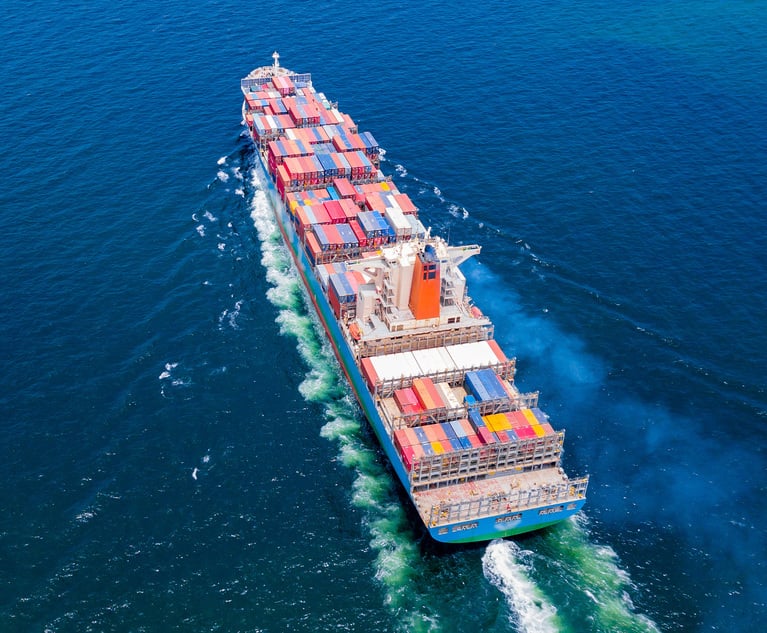 War of Russia against Ukraine. A residential building damaged by an enemy aircraft in the Ukrainian capital Kyiv, KYIV, UKRAINE – Feb. 25, 2022. Credit: Drop of Light/Shutterstock.com
War of Russia against Ukraine. A residential building damaged by an enemy aircraft in the Ukrainian capital Kyiv, KYIV, UKRAINE – Feb. 25, 2022. Credit: Drop of Light/Shutterstock.com The Russian-Ukrainian War's Impact on Maritime Commerce
From a maritime-law perspective, questions arise as to whether Russia's wanton war and its consequences may trigger a charter's force majeure clause, which generally has the effect of suspending contract performance obligations that are disrupted by unforeseeable events beyond the control of the vessel's owner or charterer.
March 20, 2022 at 05:29 PM
7 minute read
Cargo and ShippingRussia's unprovoked invasion of Ukraine has triggered significant reactions in the world of maritime commerce. In a matter of days since the beginning of Russia's main offensive, the price of bunker fuel used for vessel propulsion systems has skyrocketed as have tanker charter-hire rates and war-risk premiums for vessels transiting to or from regions impacted by the conflict, including the Baltic and Black Seas, which have been designated as "listed areas" by the insurance industry's War Risk Council. The Russian Navy has closed access to the Sea of Azov (the body of water guarded by the Crimean Peninsula that affords maritime access by Ukraine to the Black Sea, along with the port of Odessa farther to the east), and blocked the movement of numerous merchant ships therein and in the Black Sea, stranding their crews who are running low on provisions, and bringing to a halt the export of Ukrainian grain, which will severely impact the world's grain supply. The United States has imposed blocking sanctions on Russia's Central Bank and two largest commercial banks Sberbank and VTB, as well as other sanctions on Russian companies, including restricting Russia's largest maritime and freight shipping company SovComFlot's access to long-term debt, which could adversely affect its ability to construct thirty ships on order, which in turn may impact the contracted shipyards, and may indirectly affect the company's ability to charter its fleet of 140 vessels. The European Union has imposed similar sanctions on Russian banks and corporations. The United States and the EU have also agreed to restrict SWIFT bank transfers from a number of Russian banks. In addition to other sanctions that mirror those implemented by the United States and EU, Canada has banned Russian owned or registered vessels from entering Canadian waters. The United Kingdom has taken similar action. Remarkably, numerous major western companies are either cutting ties to Russia or halting business activity, which will further stifle the flow of investment capital to what soon may become the world's largest third-world country.
One Russian ship subject to the U.S. Treasury Department's Office of Foreign Asset Control (OFAC) sanctions list has been seized by France, various superyachts owned by Russian oligarchs have been seized, and a number of vessels approaching Ukrainian waters have been struck by missiles, including the tanker Millennial Spirit and cargo ships Yasa Jupiter, Namura Queen, Lord Nelson and Banglar Samriddhi. A sixth vessel, the Helt, was hit below the waterline and sank. International traders are proving more reluctant to charter Russian owned or operated vessels for fear of downstream sanctions problems, or purchase Russian oil and fuel supplies, even though sanctions have not yet been imposed on Russia's exports of crude oil, gas or coal (save for the U.S. import ban on these commodities). Vessel traffic bound for Russia has declined by more than 50% since the war started.
This content has been archived. It is available through our partners, LexisNexis® and Bloomberg Law.
To view this content, please continue to their sites.
Not a Lexis Subscriber?
Subscribe Now
Not a Bloomberg Law Subscriber?
Subscribe Now
NOT FOR REPRINT
© 2025 ALM Global, LLC, All Rights Reserved. Request academic re-use from www.copyright.com. All other uses, submit a request to [email protected]. For more information visit Asset & Logo Licensing.
You Might Like
View All
Maritime Law Column: When Is a Contract Maritime and Why Is That Important?
7 minute read

Maritime Law Column: Texas Maritime Public Infrastructure Projects to Watch
6 minute read
Law Firms Mentioned
Trending Stories
- 1Munger, Gibson Dunn Billed $63 Million to Snap in 2024
- 2January Petitions Press High Court on Guns, Birth Certificate Sex Classifications
- 3'A Waste of Your Time': Practice Tips From Judges in the Oakland Federal Courthouse
- 4Judge Extends Tom Girardi's Time in Prison Medical Facility to Feb. 20
- 5Supreme Court Denies Trump's Request to Pause Pending Environmental Cases
Who Got The Work
J. Brugh Lower of Gibbons has entered an appearance for industrial equipment supplier Devco Corporation in a pending trademark infringement lawsuit. The suit, accusing the defendant of selling knock-off Graco products, was filed Dec. 18 in New Jersey District Court by Rivkin Radler on behalf of Graco Inc. and Graco Minnesota. The case, assigned to U.S. District Judge Zahid N. Quraishi, is 3:24-cv-11294, Graco Inc. et al v. Devco Corporation.
Who Got The Work
Rebecca Maller-Stein and Kent A. Yalowitz of Arnold & Porter Kaye Scholer have entered their appearances for Hanaco Venture Capital and its executives, Lior Prosor and David Frankel, in a pending securities lawsuit. The action, filed on Dec. 24 in New York Southern District Court by Zell, Aron & Co. on behalf of Goldeneye Advisors, accuses the defendants of negligently and fraudulently managing the plaintiff's $1 million investment. The case, assigned to U.S. District Judge Vernon S. Broderick, is 1:24-cv-09918, Goldeneye Advisors, LLC v. Hanaco Venture Capital, Ltd. et al.
Who Got The Work
Attorneys from A&O Shearman has stepped in as defense counsel for Toronto-Dominion Bank and other defendants in a pending securities class action. The suit, filed Dec. 11 in New York Southern District Court by Bleichmar Fonti & Auld, accuses the defendants of concealing the bank's 'pervasive' deficiencies in regards to its compliance with the Bank Secrecy Act and the quality of its anti-money laundering controls. The case, assigned to U.S. District Judge Arun Subramanian, is 1:24-cv-09445, Gonzalez v. The Toronto-Dominion Bank et al.
Who Got The Work
Crown Castle International, a Pennsylvania company providing shared communications infrastructure, has turned to Luke D. Wolf of Gordon Rees Scully Mansukhani to fend off a pending breach-of-contract lawsuit. The court action, filed Nov. 25 in Michigan Eastern District Court by Hooper Hathaway PC on behalf of The Town Residences LLC, accuses Crown Castle of failing to transfer approximately $30,000 in utility payments from T-Mobile in breach of a roof-top lease and assignment agreement. The case, assigned to U.S. District Judge Susan K. Declercq, is 2:24-cv-13131, The Town Residences LLC v. T-Mobile US, Inc. et al.
Who Got The Work
Wilfred P. Coronato and Daniel M. Schwartz of McCarter & English have stepped in as defense counsel to Electrolux Home Products Inc. in a pending product liability lawsuit. The court action, filed Nov. 26 in New York Eastern District Court by Poulos Lopiccolo PC and Nagel Rice LLP on behalf of David Stern, alleges that the defendant's refrigerators’ drawers and shelving repeatedly break and fall apart within months after purchase. The case, assigned to U.S. District Judge Joan M. Azrack, is 2:24-cv-08204, Stern v. Electrolux Home Products, Inc.
Featured Firms
Law Offices of Gary Martin Hays & Associates, P.C.
(470) 294-1674
Law Offices of Mark E. Salomone
(857) 444-6468
Smith & Hassler
(713) 739-1250






